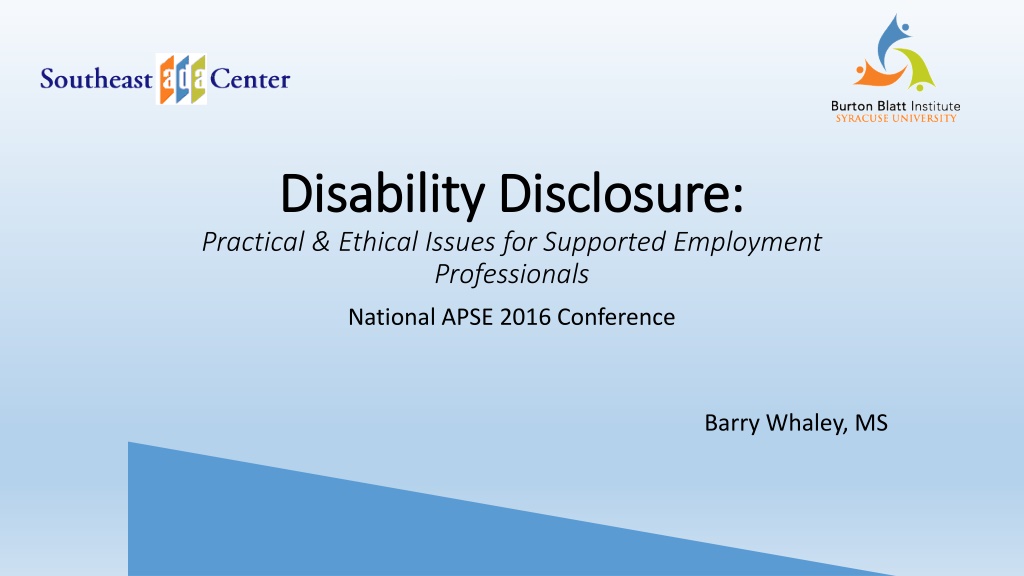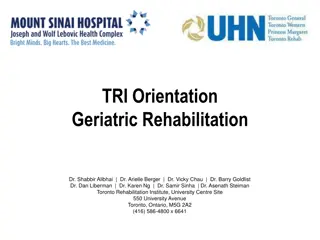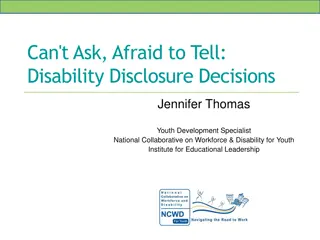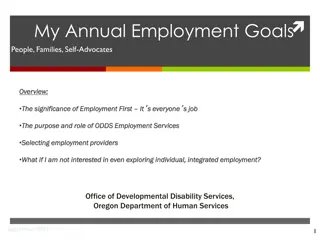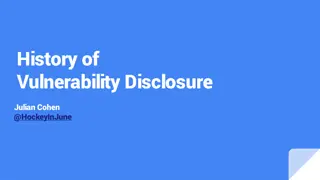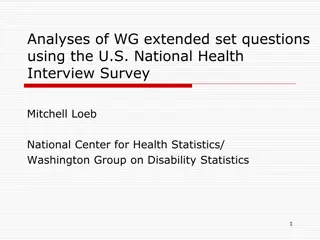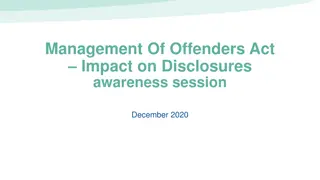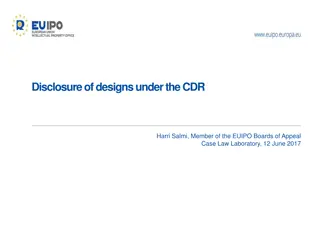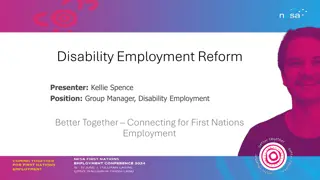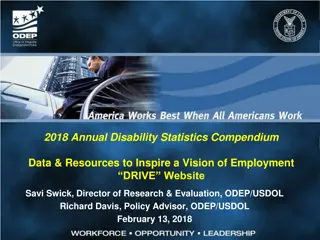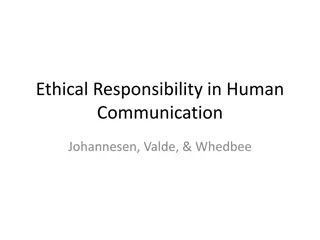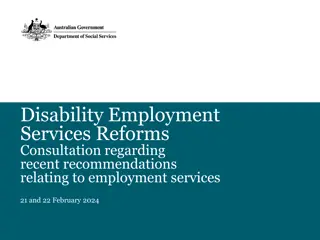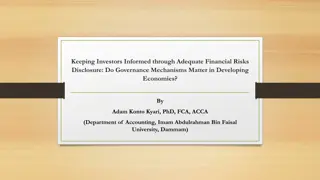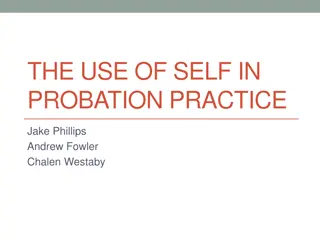Understanding Disability Disclosure in Employment: Practical and Ethical Considerations
This presentation touches on the practical and ethical issues supported employment professionals face when dealing with disability disclosure. The agenda includes ADA provisions, successful disclosure strategies, the professional's role in the process, and available resources. The session covers disability inquiries, phases of the employment process regarding inquiries, and what employers can ask in disability-related inquiries.
Download Presentation

Please find below an Image/Link to download the presentation.
The content on the website is provided AS IS for your information and personal use only. It may not be sold, licensed, or shared on other websites without obtaining consent from the author. Download presentation by click this link. If you encounter any issues during the download, it is possible that the publisher has removed the file from their server.
E N D
Presentation Transcript
Disability Disclosure: Disability Disclosure: Practical & Ethical Issues for Supported Employment Professionals National APSE 2016 Conference Barry Whaley, MS
Presenter Barry Whaley Employer Outreach Coordinator Southeast ADA Center A Project of Burton Blatt Institute at Syracuse University Barry.whaley@uky.edu Funded by the National Institute on Disability, Independent Living, and Rehabilitation Research (NIDILRR)
Disclaimer Information, materials, and/or technical assistance are intended solely as informal guidance, and are neither a determination of your legal rights or responsibilities under the ADA, nor binding on any agency with enforcement responsibility under the ADA. ADA Center is funded by the National Institute on Disability, Independent Living, and Rehabilitation Research (NIDILRR) 3
Session Agenda Understand the ADA-related provisions related to disclosure Discuss strategies for successful disclosure Understand the role of the SE professional in the disclosure process Offer resources and answer your questions 4
So What Does the ADA Say About Disclosure? 5
Disability Inquiry A question or series of questions likely to solicit information about a person s disability or related medical condition 6
Phases of the Employment Process and Disability Inquiries Pre-Employment (Before an offer of employment) No disability inquiries are allowed Pre-Employment (After an offer of employment is made) Disability inquiries are allowed only if the same inquiry is made of all candidates for the job category Employment A disability inquiry can only be made if it is job related and of a business necessity
What Can Employers Ask in Disability Inquiry? Questions about: A person s general well-being A non disability-related impairment Whether a person can perform the job functions (Essential Functions) Whether a person has been drinking Current illegal use of drugs Pregnancy info like due date and well-being Emergency contact information 8
What Employers Cant Ask in Disability Inquiry Questions about: Whether a person has or had a disability Medical documentation of a condition Genetic information Prior workers compensation history Current or past prescription medication usage 9
Disclosure Disclosure is not required under the ADA One exception requesting reasonable accommodations Disclosure can occur at any time during the employment relationship Individuals cannot be retaliated against for disclosure-related issues 10
Disclosure vs. Self-Identification Self-identification: invitation from an employer to voluntary check a box that says the individual has a disability, anonymous, typically used for data collection purposes or Section 503 utilization goals Disclosure: voluntarily sharing information about a disability. Disclosure is protected under ADA 11
Title I An employer cannot discriminate against qualified applicants and employees on the basis of disability. A qualified applicant is an individual who meets the skill, experience, education, and other job-related requirements of a position held or desired, and who, with or without reasonable accommodation, can perform the essential functions of a job.
Reasonable Accommodation Reasonable accommodation is a critical component of the ADA. Reasonable accommodation is any change in the work environment or how things are usually done that results in equal employment opportunity for an individual with a disability. A business must make a reasonable accommodation to the known physical or mental limitations of a person with a disability unless it can show that the accommodation would cause an undue hardship on the operation of the business
Essential Job Functions The reason the job exists is to perform that function. For example, an essential function of a pilot is to fly planes. Only a few employees can perform the function. The function is so highly specialized that the employer hires people into the position specifically because of their expertise in performing that function.
Reasonable Accommodation The presence of a disability does not result in a presumptive reasonable accommodation. Your responsibility is to disclose your need for accommodation Reasonable accommodations are time-limited Employers may ask for documentation of a continuing disability
Some Disclosure Basics No standardized form or set of basic information required for disclosure in the workplace Requests can be made: Verbally Written Email Someone can make the request for you A personal decision that each individual must make 16
Why Disclose in Pre-Employment? The person has an obvious disability and wants to address any concerns head-on The person needs an accommodation to participate in the interview or do the job Disclosure would offer a competitive advantage in the selection process The person wants to bring his/her whole self to work Explain the participation of a job coach or employment specialist in the process 18
When to Disclosure? What do you think? Cover letter or resume Before an interview At the interview Before starting a job After starting a job Never 19
The Art of Disclosure Good disclosure: focuses on needs Provides suggestions for reasonable accommodations Is specific rather than general (how my disability affects my ability to perform essential job functions) focuses on job qualifications, not a disability Avoids medical terms and labels Discuss work barriers, not diagnoses Focuses on the here and now, not past negative experiences Is positive 20
To Whom Do I Disclose? Varies greatly depending on the employer and the situation Possible audiences recruiters, hiring managers, supervisors/managers, human resources staff, EEO staff, co-workers, health and safety staff The key only tell those who need to know 21
Employer Responsibilities Recognize a request for accommodation has been made Begin an interactive process with the employee Confirm the existence of a disability Determine the essential functions and marginal functions of the job Investigate solutions Implement the accommodation Document the accommodation
Employer Rights Employers are not required to honor requests that: Create an undue hardship for the business If the modifications are extensive, disruptive, too costly or fundamentally changes the essential function of the job Is dangerous or illegal
Cyber Disclosure Employers may use social media to seek out information on a job candidate Be aware that what you post in social media may unintentionally disclose a disability Pictures Comments Are there things that can be misinterpreted? Be thoughtful and respectful in your posts Know what information about you can be found on-line Remember, once posted on-line, it may never go away
The Role of the Supported Employment Professional in Disclosure 25
Your Primary Role It s not your job to decide if someone should disclose! Help weigh factors and guide a decision Show support by respecting the decision to disclose or not Offer advice about how, when, and to whom to disclose 26
When Communicating with an Employer Focus on the person s abilities Offer proposed solutions that allows the person to complete the job tasks Discuss the advantages of hiring a person who has access to supported employment services Avoid labels focus on functional limitations and strategies for addressing them Focus on past success and personal life experiences that demonstrate skills and abilities Be prepared to answer questions about a specific disability 27
How do you prepare? Get permission How to address an obvious disability How to explain gaps in work history Help an employer focus on qualifications, not limitations What does the potential employee have to offer an employer Be prepared for non-compliant interview questions Recognize essential job functions from marginal functions Prepare for pre-employment testing 28
How do you prepare? Never share personal information about the job seeker with supervisors and co-workers at a job site Be careful what you share with your co-workers 29
Disclosure Tools The 411 on Disability Disclosure Workbook (National Collaborative on Workforce and Disability for Youth) Advising Youth with Disabilities on Disclosure (ODEP) The Art of Disclosing Your Disability (Richard Pimentel) Disclosure Decisions to Get the Job (VCU) Disclosure Tools (Job Accommodation Network) 31
ADA Information Enforcement Guidance: Pre-employment Disability-Related Questions and Medical Examinations (EEOC) Enforcement Guidance: Disability-Related Inquiries and Medical Examinations of Employees under the ADA (EEOC) 32
National Network of ADA Centers Map of the US indicating 10 Federal regions Ten regional centers funded by the Administration on Community Living, NIDILRR The ADA National Network provides information, guidance and training on the Americans with Disabilities Act (ADA), tailored to meet the needs of business, government and individuals at local, regional and national levels. Contact information Toll free hot line - 800-949-4232 (voice/TTY) Web site - www.adata.org 33
